Mechanical Haulage for Millers.
Page 9
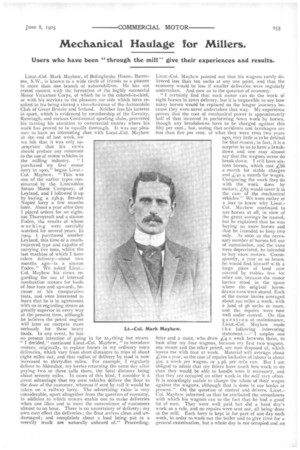
Page 10
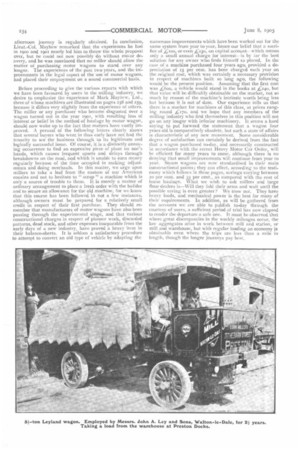
Page 11
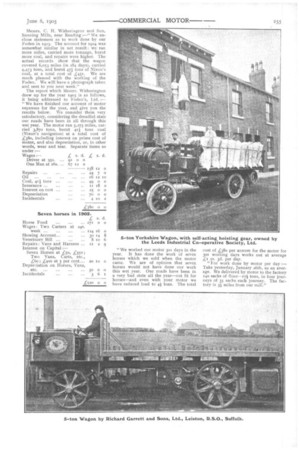
Page 12
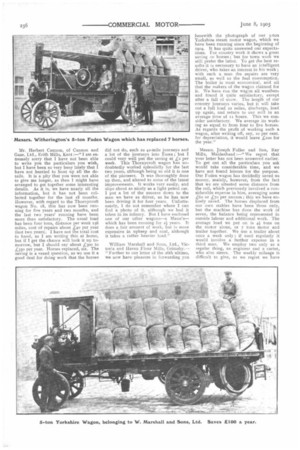
Page 13
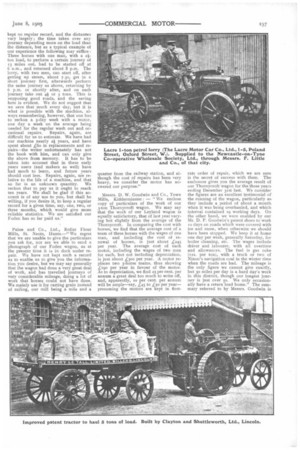
Page 14
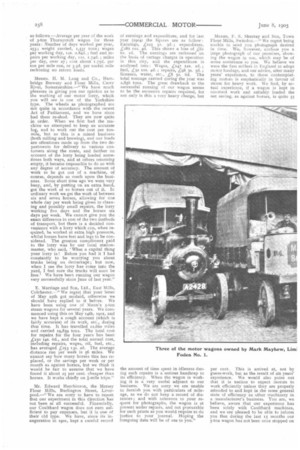
Page 15
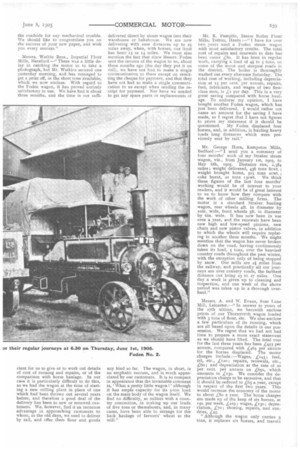
Page 16
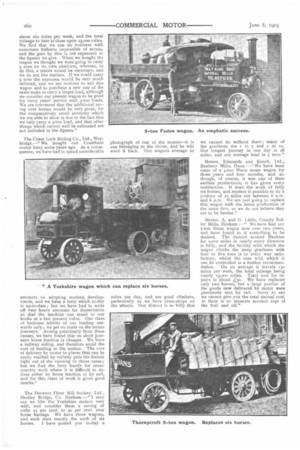
Page 17
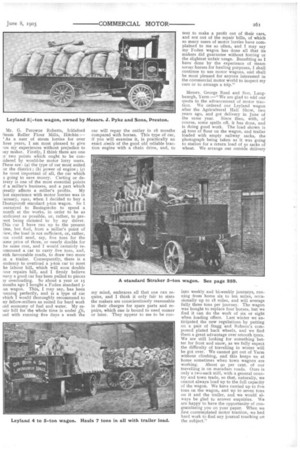
Page 18
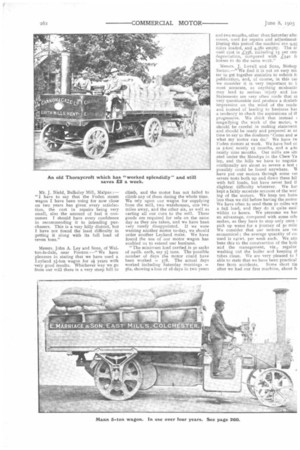
Page 19
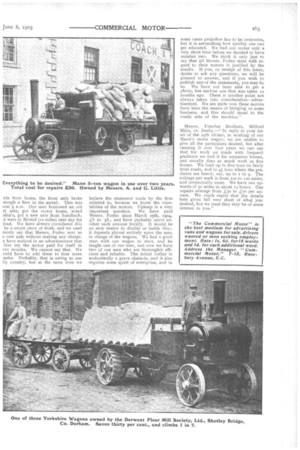
Page 20
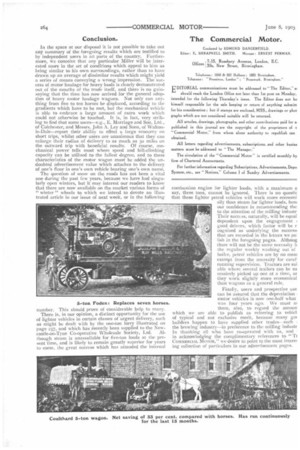
If you've noticed an error in this article please click here to report it so we can fix it.
Users who have been "through the mill" give their experiences and results.
Lieut.-Col. Mark Mayhew, of Bolingbroke House, Battersea, S.W., is known to a wide circle of friends as a pioneer in more than one branch of autornobilicm. He has not rested content with the formation of the highly successful Motor Volunteer Corps, of which he is the colonel-in-chief, or with his services to the pleasure car side which have resulted in his being elected a vice-chairman of the Automobile Club. of Great Britain and Ireland. Neither has his interest in sport, which is evidenced by membership of the Cavalry, Ranelagh, and various Continental sporting clubs, prevented his turning his attention to commercial motors where his work has proved to be equally thorough. It was our pleasure to have an interesting chat with Lieut.-Col. Mayhew at the end of last week, for
we felt that it was only appropriate that his views should preface any reference to the use of motor vehicles in the milling industry. " I purchased my first motor lorry in 1900,11 began Lieut.Col. Mayhew. "This was one of the earlier types constructed by the Lancashire Steam Motor Company, of Leyland, and I followed it up by buying a 25h.p. five-ton Napier lorry a few months later. About a year after that I placed orders for an eightton Thornycroft and a six-ton Faden, the results of whose w or king were carefully watched for several years. In 1904, 1 purchased another Leyland, this time of a muchimproved type and capable of carrying five tons, whilst the last machine of which I have taken delivery—about two months ago—is a six-tan Foden." We asked Lieut.Col. Mayhew his views regarding the use of internal combustion motors for loads of four tons and upwards, because of his comparative tests, and were interested to learn that he is in agreement with us in regarding steam as greatly superior in every way at the present time, although he believes the petrol engine will later on compete more seriously for these heavy loads. In any event, he has no present intention of going in for aliy thing but steam. " I decided," continued Lieut.-Col. Mayhew, to introduce motors, originally, to replace horses in my ordinary town deliveries, which vary from short distances to trips of about eight miles out, and that radius of delivery by road is now increased to thirty-five miles. For example, I regularly deliver to Aldershot, my lorries returning the same day after paying two or three calls there, the total distance being about seventy miles. In cases of this kind, I consider it a great advantage that my own vehicles deliver the flour to the door of the customer, whereas if sent by rail it would be taken on a railway lorry. The advertising value is very considerable, apart altogether from the question of economy, in addition to which motors enable one to make deliveries when one likes and to meet the convenience of customers almost to an hour. There is no uncertainty of delivery; my own men effect the deliveries; the flour arrives clean and undamaged; and complaints about a load being put in a weevily truck are naturally unheard of." Proceeding,
Lieut.-Col. Mayhew pointed out that his wagons rarely delivered less than ten sacks at any one point, and that the economy would be less if smaller deliveries were regularly undertaken. And now as to the question of economy. " 1 certainly find that each motor can do the work of eight horses in town delivery, but it is impossible to say how many horses would be replaced on the longer journeys because they were never undertaken that way. My experience proves that the cost of mechanical power is approximately half of that incurred in performing town work by horses, though any breakdowns have to be charged against this fifty per cent., but, seeing that accidents and breakages are less than five per cent. of what they were even two years ago, very little is to be debited for that reason ; in fact, it is a surprise to us to have a breakdown and one may almost say that the wagons never do break down. I still have sixteen horses, which cost £86 a month for stable charges and ,4;40 a month for wages. Comparing the work they do with the work done by motors, £65 would cover it in the case of the mechanical vehicles." We were rather at a loss to know why Lieut.Col. Mayhew continued to use horses at all, in view of the great savings he named, but he explained that he was buying no more horses and that he intended to keep two only. As soon as the necessary number of horses fell out of commission, and the vans were depreciated, he intended to buy more motors. Consequently, a year or so hence, he would find himself with a large piece of land now covered by stables free for other use, because the motor lorries stood in the space where the original horsedrawn vans were stored. Each of the motor lorries averaged about zoo miles a week, with a load of 56 sacks or more, and the repairs were now well under control. On this quest ion of maintenance, I.ieut.-Col. Mayhew made t h e following interesting statement I employ one fitter and a mate, who draw £4 a week between them, to look after my four wagons, because my first two wagons, one steam and the other petrol, are now disposed of, which leaves me with four at work. Material will average about .too a year, so the cost of repairs inclusive of labour is about 30s. a week per wagon, or 3.5d. per mile run. But I am obliged to admit that my fitters have much less work to do than they would be able to handle were it necessary, and that they are occupied on other work in the mill very often. It is accordingly unfair to charge the whole of their wages against the wagons, although that is done in our books at present." On the question of control and drivers, Lieut.Col. Mayhew informed us that he attributed the smoothness with which his wagons ran to the fact that he had a good lot of men. They were well paid but did a hard day's work as a rule, and no repairs were sent out, all being done at the mill. Each lorry is kept in for part of one day each week, in order to wash out the boiler and to give time for a general examination, but a whole day is not occupied and an afternoon journey is regularly obtained. In conclusion, Lieut.-Col. Mayhew remarked that the experiences he had in two and Igor nearly led him to throw the whole proposal over, but lie could not now possibly do without anoac)r delivery, and he was convinced that no miller should allow the matter of purchasing motor wagons to stand over any longer. The experiences of the past two years, and the improvements in the legal aspect of the use of motor wagons, had. placed their employment on a sound commercial basis.
Before proceeding to give the various reports with which we have been favoured by users in the milling industry, we desire to emphasise the experience of Mark Mayhew, Ltd., three of whose machines are illustrated on pages 258 and 259, because it differs very slightly from the experience of others. The miller or any purchaser who became disgusted over a wagon turned out in the year tacit, with resulting loss of interest or belief in the method of haulage by motor wagon, should now wake up to the fact that matters have vastly improved. A perusal of the following letters clearly shows that several buyers who went in thus early have not had the tenacity to see the business through to its legitimate and logically successful issue. Of course, it is a distinctly annoying occurrence to find an expensive piece of plant on one's hands, which causes frequent upsets and delays through breakdowns on the road, and which is unable to earn money regularly because of the time occupied in making adjust. ments and -doing overhauls. In this matter, we urge upon millers to take a leaf from the custom of our American cousins and not to hesitate to " scrap" a machine which is only a source of trouble to them. It is merely a matter of ordinary arrangement to place a fresh order with the builder and to secure an allowance for the old machine, for we know that this course has been followed in not a few instances, although owners must be prepared for a relatively small credit in respect of their first purchase. They should remember that manufacturers of motor wagons have also been passing through the experimental stage, and that various constructional charges in respect of pioneer work, discarded patterns, dead stock, and other expenses inseparable from the early days of a new industry, have proved a heavy item in their balance-sheets. It is seldom a satisfactory procedure to attempt to convert an old type of vehicle by adapting the numerous improvements which have been worked out for the same system from year to year, hence our belief that a sacrifice of „4;too, or even -a4;a5o, on capital accountwhich means only a stnall annual charge for interestis by lar the best solution for any owner who finds himself so placed, In the case of a machine purchased four years ago, provided a depreciation of ra per cent. has been charged each year on the original cost, which was certainly a necessary provision in respect of machines built so long ago, the following would be the present position. Assuming that the first cost was .0ioo, a vehicle would stand in the books at ,240, but that value will be difficultly obtainable on the market, not so much by reason of the machine's intrinsic worth being less but because it is out of date. Our experience tells us that there is a market for machines of this class, at. prices ranging round ,,.;170, and we hope that any members of the milling industry who find themselves in this position will not go on any longer with inferior machinery. It seems a hard saying to put forward the statement that a wagon four years old is comparatively obsolete, but such a state of affairs is characteristic of any new movement. Some considerable degree of satisfaction can certainly be derived from the fact that a wagon purchased to-day, and necessarily constructed in accordance with the recent Heavy Motor Car Order, will be efficient for many years to come, although there is no denying that small improvements will continue from year to year. Steam wagons are now standardised in their main constructional points ; they can effect, according to the testimony which follows in these pages, savings varying between 20 per cent. and. 33 per cent., as compared with the cost of horse haulage. What we wish to ask millers and large flour dealers is—Will they fold their arms and wait until the possible saving is even greater? We trow not. They have heavy loads, and mechanical power is the best for many of their requirements. In addition, as will be gathered from the accounts we are able to publish to-day through the courtesy of users, a sufficient period of trial has now elapsed to render the departure a safe one. It must be observed that where great discrepancies in the weekly mileages occur, the low aggregates arise in work between mill and station, or mill and warehouse, but with regular loading an economy is obtainable even where the trips are less than a mile in length, though the longer journeys pay best.
Messrs. C. H. Witherington and Son, Sonning Mills, near Reading :—" We enclose statement as to work done by our Foden in 1903. The account for 1904 was somewhat similar in net result : we ran more miles, carried more tonnage, burnt more coal, and repairs were higher. The actual records show that the wagon covered 6,053 miles (in 284 days), carried 4,473 tons, and burnt 471 tons of Nixon's coal, at a total cost of 4451. We are much pleased with the working of the Foden. We will have a photograph taken and sent to you next week."
The report which Messrs. Witherington drew up for the year 1903 is as follows, it being addressed to Foden's, Ltd. :— "We have finished our account of motor expenses for the year, and give you the results below. We consider them very satisfactory, considering the dreadful state our roads have been in all through this wet year. The motor ran 5,275 miles, car ried 3,870 tons, burnt 41 tons coal (Nixon's navigation) at a total cost of 4380, including interest on prime cost of motor, and also depreciation, or, in other words, wear and tear. Separate items as under :—
Wages:— s. d. s. d. Driver at 355. ... 91 0 0 One Man at 265.... 67 IS o 158 12 0
Repairs ... :-• 44 7
Oil ... .. 16 12 10
Coal, 411 tons ... ••• 49 Insurance ...........n 18 o Interest on cost ... ••• 25
Depreciation •.• 70 0 0 Incidentals ••• 4 10 2 Horse Food ... ... 271 0 0
Wages: Two Carters at 245. 16 o Shoeing Account... 3o r4 8 Veterinary Bill 8 io 6
Repairs : Vans and Harness ... ir 2 9 Interest on Capital : Seven Horses at 45o, £350; Two Vans, Carts, etc., £6o; 4400 at 5 per cent.... 20 10 Depreriation on Horses, Vans, "We worked our motor 301 days in the year. It has done the work of seven horses which we sold when the motor came. We are of opinion that seven horses would not have done our work this wet year. Our roads have been in a very bad state all the year—not fit for horses—and even with your motor we have reduced load to 4f tons. The total
cost of £38o per annum for the motor for 301 working days works out at average 41 5s. 3d. per day.
"For work done by motor per day :— Take yesterday, January 26th, as an average. We delivered by motor to the factory 140 sacks of flour—r tons, in four journeys of 35 sacks each journey. The factory is 31 miles from our mill." Mr. Herbert Cannon, of Cannon and
Gaze, Ltd., Erith Mills, Kent am extremely sorry that I have not been able to write you the particulars you wish, but I have been so very busy lately that I have not hurried to hunt up all the details. It is a pity that you were not able to give me longer, as then I might have arranged to get together some interesting details. As it is, we have nearly all the information, but it has not been collected together for the last y8 months. However, with regard to the Thornycroft wagon No. 18, this has now been running for five years and two months, and the last two years' running have been more than satisfactory. The usual load has been four tons, distance per week 156 miles, cost of repairs about Lao per year (last two years). I have not the total cost to hand, as I am writing this at home, but if I get the chance will look it up tomorrow, but I should say about Z3oo to £350 per year Horses replaced, six. The saving is a vexed question, as we use it a good deal for doing work that the horses did not do, such as 42-mile journeys and a lot of the journeys into Essex ; but I could very well put the saving at £2 per week. This Thornycroft wagon has undoubtedly worked splendidly for the last two years, although being so old it is one of the pioneers. It was thoroughly done up then, and altered to some of the latest improvements. It works very easily, and slips about as nicely as a light petrol car. I put a lot of the success down to the man we have as driver, as he has now been driving it for four years. Unfortunately, I do not remember where I can find a photo of it, although we had it taken in its infancy. But I have enclosed one of our other wagons—a Mann's— which has been running for 2i years. it does a fair amount of work, but is more expensive in upkeep and coal, although it takes a rather heavier load."
William Marshall and Sons, Ltd., Victoria and Haven Flour Mills, Grimsby.-" Further to our letter of the 26th ultimo, we now have pleasure in forwarding you
herewith the photograph of our 5-ton Yorkshire steam motor wagon, which we have been running since the beginning of 1904. It has quite answered our expectations. For country work it shows a great saving on horses ; but for town work we still prefer the latter. To get the best results it is necessary to have an intelligent driver, who takes an interest in his work ; with such a man the repairs are very small, as well as the fuel consumption. The boiler is most economical, and all that the makers of the wagon claimed for it. We have TIM the wagon all weathers and found it quite satisfactory, except after a fall of snow. The length of our country journeys varies, but it will take out a full load 22 miles, discharge, load up again, and return to our mill in an average time of it hours. This we consider satisfactory. We average its working as equal to from four to five horses. As regards the profit of working such a wagon, after writing off, say, to per cent. for depreciation, it would leave zioo for the year," Messrs. Joseph Fuller and Son, Ray Mills, Maidenhead :—" We regret that your letter has not been answered earlier. To get out all the particulars you ask would take considerable time, and we have not found leisure for the purpose. Our Foden wagon has decidedly saved us money, mainly, however, from the fact that we are situated some distance from the rail, which previously involved a considerable expense in hire, averaging some .4.60 or £7o per annum ; this we have entirely saved. The horses displaced from our own stables have been three only, but the machine has done the work of seven, the balance being represented in outside labour and additional work. The average load we put on is 44. tons on the motor alone, or 7 tons motor and trailer together. We use a trailer about once a week only ; if used regularly it would involve a further expense in a third man. We employ two only as a regular thing, an engineer and a carter, who also steers. The weekly mileage is difficult to give, as we regret we have kept no regular record, and the distances vary largely ; the time taken over any journey depending more on the load than the distance, but as a typical example of our experience the following may suffice : Three horses with one man, with a 2iton load, to perform a certain journey of 13 miles out, had to be started off at 6 a.m., and returned about 8 p.m. The lorry, with two men, can start off, after getting up steam, about 7.30, get in a short journey first, afterwards perform the same journey as above, returning by 6 p.m. or shortly after, and on each journey take out 4 or 5 tons. This is supposing good roads, and the saving here is evident. We do not suggest that we save that much every day, but it is what is possible with the machine, always remembering, however, that one has to reckon a 5-day week with a motor, one day a week on the average being needed for the regular wash out and occasional repairs. Repairs, again, are difficult for us to estimate. We have had our machine nearly 24years, and have spent about 46o in replacements and repairs—the writer unfortunately has not the book with him, and can only give the above from memory. It has to be taken into account that in these early years users (and makers as well) have had much to learn, and future years should cost less. Repairs, again, are relative to the life of a machine, and that so far is an unknown quantity. We reckon that to pay us it ought to reach ten years. We shall be glad if this account is of any use to you, but shall be willing, if you desire it, to keep a regular record for a given time, say, one, two, or three months, which would give more reliable statistics. We are satisfied our Foden has so far paid us."
Paine and Co., Ltd., Roller Flour Mills, St. Neots, hunts.—" We regret that we are unable to give the particulars you ask for, nor are we able to send a photograph of our Foden wagon, as at the present time it is in dock under repair. We have not kept such a record as to enable us to give you the information you desire, but we may say generally that the wagon had done a very great deal of work, and has travelled journeys of very considerable mileage, doing a lot of work that horses could not have done. We mainly use it for carting grain instead of railing, our mill being a mile and a quarter from the railway station, and although the cost of repairs has been very heavy, we consider the motor has answered our purpose."
Messrs. D. W. Goodwin and Co., Town Mills, Kidderminster: — "We enclose copy of particulars of the work of our 3-ton Thornycroft wagon. We may say that the work of our Leyland wagon is equally satisfactory, that of last year varying but slightly from the average of the Thornycroft. In comparing the cost with horses, we find that the average cost of a team of three horses with the wages of one man, and including the cost of renewal of horses, is just about £245 per year. The average cost of each motor, including the wages of two men for each, but not including depreciation, is just about £300 per year. 'A motor replaces two 3-horse teams, thus showing Zrgo per year in favour of the motor. As to depreciation, we find as per cent. per annum a great deal too much to write off, and, apparently, JO per cent. per annum will be ample—say, £45 to £5o per year— presuming the motors are kept in first rate order of repair, which we are sure is the secret of success with them. The enclosure gives you the average result of our Thornycroft wagon for-the three years ending December 31st last. We consider the figures are an excellent testimonial of the running of the wagon, particularly as. they include a period of about a month when it was being overhauled, and which interval contained ro working days. On the other hand, we were enabled by our Mr. D. P. Goodwin's patent shoes to work to days on roads which were covered. with ice and snow, when otherwise we should have been stopped. We keep it at home one day per week, generally Saturday, for boiler cleaning, etc. The wages include driver and labourer, with all overtime and allowances. The fuel is gas coke (trs. per ton), with a truck or two of Nixon's navigation coal in the winter time when the roads are bad. The mileage is the only figure we cannot give exactly, but 30 miles per day is a hard day's work in this district, though our longest journey is just over 5o. We only occasionally have a return load home." The summary referred to by Messrs. Goodwin is
as follows :—Average per year of the work of 3-ton Thornyeroft wagon for three years : Number of days worked per year, 253; weight carried, 1,531 tons ; wages per working day, 125. o.84(1..; fuel and repairs per working day, I's. 1.74d. ; miles per day, over 27; cost about 1.75d. per ton per mile run, or 3.5d. per useful mile reckoning no return loads.
Messrs. H. M. Lang and Co., Ham. bridgeBrewery and Flour Mills, Corry Rivel, Somersetshire.—" We have much pleasure in giving you our opinion as to the working of our motor lorry, which you will see is one of the Yorkshire type. The wheels as photographed are not quite in accordance with the recent Act of Parliament, and we have since had them re-shod. They are now quite in order. When we first had the machine we attempted to keep an accurate log, and to work out the cost per tonmile, but as this is a mixed business (both milling and brewing), and our loads are oftentimes made up from the two departments for delivery to various customers along the route, and further on account of the lorry being loaded sometimes both ways, and at others returning empty, it became impossible to do SO with any degree of accuracy. The amount of work to be got out of a machine, of course, depends so much upon the business. Some short time ago we were very busy, and, by putting on an extra hand, got the work of zo horses out of it. In ordinary work we get the work of between six and seven horses, allowing for one whole day per week being given to cleaning and possibly small repairs, the lorry working five days and the horses six days per week. We cannot give you the exact difference in cost of the two methods of transport, but there is a decided convenience with a lorry which can, when required, be worked at extra high pressure, whilst horses have feet and legs to be consideredThe greatest compliment paid to the lorry was by our local stationmaster, who said, 'What a capital thing
your lorry is Before you had it I had constantly to be worrying you about trucks being on demurrage; but now, when I see the lorry has Come into the yard, I feel sure the trucks will soon be free.' We have been running our wagon very successfully since June of last year."
E. Marriage and Son, Ltd., East Mills, Colchester.—" We regret that your letter of May 25th got mislaid, otherwise we should have replied to it before. We have been using one of Mann's 5-ton steam wagons for several years. We commenced using this on May t4th, 1901, and we have kept a rough account (which is fairly accurate) of its work, etc., during that time. It has travelled s r,66o miles and carried 19,859 tons. The total cost for repairs for the four years has been
230 e45. 6d., and the total annual cost, including repairs, wages, oil, fuel, etc., has averaged £253 135. 2c1. The average distance run per week is 56 miles. We cannot say how many horses this has replaced, or the savings per week or per month as against horses, but we think it would be fair to assume that we have found it about 25 per cent. cheaper than horses. It works chiefly on ,1;--mile trips."
Mr. Edward Hutchinson, the Mersey Flour Mills, Burlington Street, Liverpool.—" We are sorry to have to report that our experiment in this direction has not been at all successful. Financially, our Coultbard wagon does not earn sufficient to pay expenses, but it is one of their old type. We have, since its inauguration in Igo', kept a careful record of earnings and expenditure, and for last year (19°4} the figures are as follow : Earnings, 4225 5.9. 3d. ; expenditure, 1;286 sm. 4d. This shows a loss of L131 6s. id. The earnings are reckoned on the basis of cartage charges in operation in this city, and the expenditure is analysed into : Wages, .4147 e25. Id. ; fuel, .432 ios. 4d. ; repairs, Z98 3s. 5d, ; licenses, water, etc., L8 5s. 6d. The total tonnage carried during the year was 2,856 tons. The great drawback to the successful running of our wagon seems to be the excessive repairs required, for not only is this .1 rely heavy charge, but
the amount of time spent in idleness during such repairs is a serious handicap to its efficiency. When the wagon is working it is a very useful adjunct to our business. We are sorry we are unable to furnish you with particulars of mileage, as we do not keep a record of distances ; and with reference to your request for photographs, the wagon is at present under repairs, and not procurable for such prints as you would require to do justice to your journal. Hoping the foregoing data will be of use to you." Messrs. F. S. Skurray and Son, Town Flour Mills, Swindon.—" We regret being unable to send you photograph desired in time. We, however, enclose you a large photograph of our premises, showing the wagon in use, which may be of some assistance to you. We believe we were the first millers in England to adopt motor haulage, and our advice, after many years' experience, to those contemplating motors is emphatically in favour of etearn for heavy work. We find, by actual experience, if a wagon is kept in constant work and suitably loaded the net saving, as against horses, is quite 33 per cent. This is arrived at, not by guess-work, but as the result of six years' experience. Wo would also point out that it is useless to expect motors to work efficiently unless they are properly attended to and kept in the same general state of efficiency as other machinery in a manufacturer's business. You are, we believe, aware that our experience has been solely with Coult.hard machines, and we are pleased to be able to inform you that during the last re months our 5-ton wagon has not been once stopped on the roadside for any mechanical trouble. We should like to congratulate you on the success of your new paper, and wish you every success."
Messrs. Watkin Bros., Imperial Flour Mills, Hereford.—" There was a little delay in catching the motor in to take a photograph, but Mr. Watkins secured one yesterday morning, and has managed to get a print off, in the short time available, which we now enclose. With regard to the Foden wagon, it has proved entirely satisfactory in use. We have had it about three months, and the time is not mill cient for us to give or to work out details of cost of running and repairs, or of the comparison with horse haulage. In our case it is particularly difficult to do this, as we had the wagon at the time of starting a new milling plant in place of ono which had been thrown out several years before, and therefore a good deal of the delivery has been to new or renewed customers. We, however, find it an immense advantage in approaching customers to whom, in the old days, we used to deliver by rail, and offer them flour and goods delivered direct by steam wagon into their warehouse or bakehouse. We are now delivering with ease distances up to 25 miles away, when, with horses, our limit has beerr 13 or 14 miles. We must also mention the fact that since Messrs. Foden sent the invoice of the wagon to us, about three months ago (the day they put it on rail), we have not had to make a single communication to them except on remitting the cheque for payment, and that they have not had to make a single communication to us except when sending the receipt for payment. Nor have we needed to get any spare parts or replacements of
any kind so far. The wagon, in short, is an emphatic success, and is much appreciated by our customers. It is so compact in appearance that the invariable comment is, 'What a pretty little wagon !' although it has ample capacity for its 5-ton load on the main body of the wagon itself. We find no difficulty, as millers with a country connection, in making up our loads of five tons or thereabouts, and, in many cases, have been able to arrange for the back haulage of farmers' wheat to the mill."
Mr. R. Pamplin, Steam Roller Flour Mills, Totton, Ilants :—" I have for over two years used a Foden steam wagon with most satisfactory results. The total cost of repairs and renewals to date has been under £80. It has been in regular work, carrying a load of 44 to 5 tons, on some of the worst and steepest roads in the district. The boiler is thoroughly washed out every alternate Saturday. The total cost of working, including depreciation at is per cent. per annum, repairs, fuel, lubricants, and wages of two firstclass men, is ,4:x per day. This is a very great saving compared with horse haulage. To endorse my opinion, I have bought another Foden wagon, which has just been delivered. I would rather not name an amount for the saving I have made, as I regret that I have not figures to prove my statement if it should be questioned. My Foden displaced four horses, and, in addition, is hauling heavy loads long distances which were previously sent by rail."
Mr. George Horn, Kempston Mills, Bedford :—"I send you a summary of four months' work of my Straker steam wagon, viz., from January z st, 1905, to May 6th, 1905. Distance run, 2,384 miles; weight delivered, 436 tons 8cwt. ; weight brought home, 503 tons 2cwt. ; coke burnt, 21 tons x3cwt. We think these figures of the last four months' working would be of interest to your readers, and it would be of great interest to us to know how they compare With the work of other milling firms. The motor is a standard Straker hauling wagon, rear wheels 4ft. in diameter by min, wide, front wheels 3ft. in diameter by 6in. wide. It has now been in use over a year, and the renewals have been new high and low-speed pinions, new chain and new piston valves, in addition to which the wheels will require replating in another three months. We might mention that the wagon has never broken down on the road, having continuously taken its load, 5 tons, over the heaviest country roads throughout the past winter, with the exception only of being stopped by snow. Our mills are 24 miles from the railway, and practically all our journeys are over country roads, the farthest distance out being 23 to 27 miles. One day a week is given up to cleaning and inspection, and one week of the above period was taken up in a thorough overhaul."
Messrs. A. and W. Evans, Soar T.ane Mill, Leicester.—" In answer to yours of the 27th ultimo, we herewith enclose prints of our Thornycroft wagon loaded with 3 tons of flour, etc. We also enclose a few particulars of its running, which are all based upon the details in our possession. We regret that we had not had time to prepare a more exact statement as we should have liked. The total cost for the last three years has been £453 per annum, compared with £464 per annum for the horses displaced. The motor charges include :—Wages, L'43; fuel, oil, etc., £120; repairs, renewals, etc., £6o; and depreciation at the rate of 20 per cent, per annum on 4650, which amounts to £130. We consider the depreciation charge to be excessive, and that it should be reduced to £65 a year, except in respect of the first two years. This would increase the economy of the motor to about 48o a year. The horse charges are made up of the keep of six horses, at 14s. per week, £219; wages, £130; depreciation, £70; shoeing, repairs, and sundries, £45.
"Although the wagon only carries 3 tons, it replaces six horses, and travels about 16o miles per week, and the total mileage to date is close upon 23,000 miles. We find that we can do business with customers hitherto impossible of access, and the gain by this is not expressed in the figures we give. When we bought the wagon we thought we were going to carry 5 tons on its own platform, whereas, to do this, a trailer would be necessary, and we do not like trailers. If we could carry 5 tons the expenses would be very much reduced, and we are anxious to sell this wagon and to purchase a new one of the same make to carry a larger load, although we consider our present wagon to be good for many years' service with 3-ton loads. We are convinced that the additional saving over horses would be very great, for the comparatively small economy which we are able to show is due to the fact that we only carry a 3-ton load, and that other things which cannot well be estimated are not included in the figures."
The Coxes Lock Milling Co., Ltd., Weybridgo.—" We bought our Coulthard motor lorry some years ago. As a consequence, we have had to spend considerable
amounts on adopting modern developments, and we have a lorry which to-day is up-to-date ; but we have had to write off very heavy amounts for depreciation so that the machine can stand in our books at a fair present value. Our class of business admits of our loading outwards only ; we get no loads on the return journeys. Arising principally from these causes, we have found that on short journeys horse traction is cheaper. We have a railway siding. and therefore avoid the cost of hauling to the station. The cost of delivery by motor to places that can be easily reached by railway puts the former right out of the running in those cases ; but we find the lorry handy for crosscountry work where it is difficult to deliver either by horse traction or by rail, and for this class of work it gives good results."
The Derwent Flour Mill Society, Ltd., Shotley Bridge, Co. Durham —"I may say we like the Yorkshire motors very well, and consider them a saving of quite 25 per cent. to 30 per cent. over horse haulage. We have three wagons, and each does exactly the work of six horses. I have posted you to-day a we cannot do without them; many of the gradients are i in 7 and i in to. Our longest journey in one day is 28 miles, and our average load is 5 tons."
Messrs. Edmunds and Kench, Ltd., Banbury Mills, Oxon 1—" We have been users of a 4-ton Mann steam wagon for three years and four months, and although, of course, it was one of their earliest productions, it has given every satisfaction. It does the work of fully six horses, and renders it possible to do a journey of 20 miles out between 6 a.m. and 6 p.m. We are just going to replace this wagon with the latest production of the same firm, as we do not believe they are to be beaten."
Messrs. A. and C. Little, County Roller Mills, llexham:---" We have had our 5-ton Mann wagon now over two years, and have found in it everything to be desired. The district around Hexham for some miles in nearly every direction is hilly, and the facility with which the wagon climbs the steep gradients with four to five tons is in every way satisfactory, whilst the ease with which it can be controlled is a further recommendation. On an average it travels 130 miles per week, the total mileage being nearly 13,000 miles. Total cost for repairs is about Z30. We have replaced cnly two horses, but a large portion of the goods now delivered by motor were previously sent by rail. Sorry to say we cannot give you the total annual cost, as there is no separate account kept of the fuel and oil." Mr. G. Perowne Roberts, Ickleford zteam Roller Flour Mills, Ilitchin 'As a user of steam lorries for over hree years, I am most pleased to give 'on my experiences without prejudice to my maker. Firstly, I think there are one >r two points which ought to be conidered by would-be motor lorry users. ['hese are : (a) the type of car most suited or the district ; (b) power of engine ; (c) he most important of all, the car which s going to save money. Carting or deivery is one of the most essential points
a miller's business, and a part which
freatly affects a miller's profits. My list experience with motor lorries was in ranuary, 1902, when I decided to buy a rhornycroft standard 3-ton wagon. So I ourneyed to Basingstoke to spend a nonth at the works, in order to be as noficient as possible, or, rather, to prerent being dictated to by my driver. [his car I have run up to the present ime, but find, from a miller's point of new, the load is not sufficient, or, rather, rou could send, say, five tons for the ;ame price of three, or nearly double for he same cost, and I would certainly re:ommend a car to carry five tons, and, with favourable roads, to draw two more m a trailer. Consequently, there is a endency to overload a 3-ton car to meet he labour bill, which will soon double rour repairs bill, and I firmly believe nany a good car has been pulled to pieces >y overloading. So about a year or zs nonths ago I bought a Foclen standard son wagon. This, I may say, has been 'tinning perfectly, and is a type of car vhich I would thoroughly recommend to ny fellow-millers as suited for hard work Lnd economy of fuel and water. My re)air bill for the whole time is under £6, ind with running five days a week the car will repay the outlay in 18 months compared with horses. This type of car, if you will examine it, is practically an exact simile of the good old reliable traction engine with a chain drive, and, to
my mind, embraces all that one can require, and I think it only fair to state the makers are conscientiously reasonable in their charges for spare parts and repairs, which one is bound to need sooner or later. They appear to me to be con
tent to make a profit out of their cars, and not out of the repair bills, of which so many users of motor lorries have complained to me so often, and I may say my Foden wagon has done all that its makers did guarantee without forcing or the slightest unfair usage. Benefiting as I have done by the experience of steam versus horses for hauling purposes, I shall continue to use motor wagons, and shall he most pleased for anyone interested in the commercial motor world to inspect my cars or to arrange a trip."
Messrs. George Reed and Son, Langbaurgh, Yarm :—" We are glad to add our quota to the advancement of motor traction. We ordered our Leyland wagon after the Agricultural Hall Show, two years ago, and got delivery in June of the same year. Since then, with, of course, some spells off, it has done, and is doing good work. The load shown is 44 tons of flour on the wagon, and trailer loaded with empty railway sacks, the photograph being taken as it was going to station for a return load of so sacks of wheat. We arrange our outside delivery into weekly and bi-weekly journeys, running from home six to ten miles, occasionally up to z8 miles, and will average fully three tons per journey. The wagon was bought to replace four horses, but we find it can do the work of six or eight when loading offers. Last winter we anticipated the new regulations by putting on a pair of Stagg and Robson's compound plated back wheels, and we find them a great advantage over smooth tyres. We are still looking for something better for frost and snow, as we fully expect the difficulty of travelling in winter will be got over. We cannot get out of Yarm without climbing, and this keeps us at home sometimes when town wagons are working. About go per cent, of our travelling is on macadam roads. Ours is only a two-sack mill, with a general country and town trade, so that, naturally, we cannot always load up to the full capacity of the wagon. We have carried up to five tons on the wagon, and up to seven tons on it and the trailer, and we would always be glad to answer enquiries. We are happy to have the opportunity of congratulating you on your paper. When we first contemplated motor traction, we had hard work to find any journal touching on the subject."
Mr. J. Nield, Bullteley Mill, Malpas :— "I have to say that the Foden steam wagon I have been using for now close on two years has given every satisfaction, the cost in repairs being very small, also the amount of fuel it consumes I should have every confidence in recommending it to intending purchasers. This is a very hilly district, but I have not found the least difficulty in getting it along with its full load of seven tons."
Messrs. John A. Ley and Sons, of Walton-le-dale, near Preston :—" We have pleasure in stating that we have used a Leyland 51-ton wagon for 21years with very good results. Whichever way we go from our mill there is a very steep hill to
climb, and the motor has not failed to climb any of them during the whole time. We rely upon our wagon for supplying from the mill, two warehouses, one two miles away, and the other six, as well as carting all our corn to the mill. These goods are required for sale on the same day as they are taken, and we have been very rarely disappointed. If we were wanting another motor to-day, we should order another Leyland make. We have found the use of our motor wagon has enabled us to extend our business.
"The minimum load carried is 50 sacks of 2401b. each, say 51 tons. The possible number of days the motor ceuld have been worked = 578. The actual days worked including Saturday mornings = 562, showing a loss of i6 days in two years
and two months, other than Saturday alto: noons, used for repairs and adjustment! During this period the machine ran 9,9.3 miles loaded, and 4,380 empty. The at nual cost is 4338, including 15 per con depreciation, compared with .454o ft horses to do the same work."
Messrs. J. Lovell and Sons, Bishop Sutton.—' We find it is not an easy ma ter to get together statistics to submit fc publication, and, of course, in this cat we consider it is very important to t most accurate, as anything misleadin may lead to serious injury and losi Statements are very often made that a I very questionable and produce a doubtft impression on the mind of the reade and instead of leading to business hao. a tendency to check the aspirations of tt progressive. We think that instead ( magnifying the work of the motor, -5", should be careful in making statement. and should be ready and prepared at an time to say to the doubters Come and s< what my motor can do.' We have tw Foden motors at work. We have had or (a 5-ton) nearly 15 months, and a 4-to nearly nine months. Our mills are sitt ated under the Mendips in the Chew Va ley, and the hills we have to negotial continually are about as severe a test t possibly could be found anywhere. 1-1. have put our motors through some vet severe tests both up and down these hit with full loads, but have never had ti slightest difficulty whatever. We hat kept a fairly accurate account of the war. trig, of the motors. We keep ten hors, less than we did before having the motor We have often to send them 5n miles wit a full load, and they do it quite easil within iz hours. We presume we hat an advantage, compared with some 0th, makes, as they have to stop only once 1 pick up water for a journey of 50 mile We consider that our motors are vei economical ; the average quantity of co; used is mcwt. per week each. We aft:hute this to the construction of the boil, and the management, viz., regular: washing out the boiler and keeping ti tubes clean. We are very pleased to I able to state that we have been practical
free from accidents. Some short tin after we had our first machine, about St
.rds from home, the front axle broke trough a flaw in the metal). This was out 9 a.m. Our men borrowed an old rt axle, got the motor home, wired >den's, got a new axle from Sandbach,
d were in Bristol (is miles) next day for load. We have always considered this be a smart piece of work, and we need arcely say that Messrs. Foden sent us e new axle without making any charge. e have noticed in an advertisement that firm say the motor paid for itself in can months. We cannot say that. We ould have to add three to four more mths. Probably, that is owing to our lly country, but at the same time we
believe the statement made by the firm referred to, because we know the capabilities of the motors. Upkeep is a very important question. We have paid Messrs. Foden since March 25th, 5904, 48 55. 3c1., and have probably spent another such amount locally. It would ho an easy matter to double or treble this; it depends almost entirely upon the man in charge of the wagons. We had a good man with our wagon to start, and he taught one of our men, and now we have two of our men who are thoroughly efficient and reliable. The initial outlay is undoubtedly a grave obstacle, and it also requires some spirit of enterprise, and in some cases prejudice has to be overcome,. but it is astonishing how quickly one can get educated. We had one motor only a very short time before we decided to have number two. We think it only just to say that all Messrs. Foden state with regard to their motors is justified by the results. If you, on receipt of this letter, desire to ask any questions, we will be pleased to answer, and if you wish to publish any of the statements, you may do so. We have not been able to get a photo, but enclose one that was taken 12 months ago. There is another point not always taken into consideration—advertisement. We are quite sure these motors have been the means of bringing us some business, and this should stand to the credit side of the machine."
Messrs. Fletcher Brothers, Milford Mills, nr. Derby.—" in reply to your letter of the 25th ultimo, re working of our Mann's steam wagon, we are unable to give all the particulars desired, but after running ft over four years we can say that for work on roads with frequent gradients we find it far surpasses horses, and usually does as much work as five horses. We load up to five tons on fairly level roads, and to gi tons where the gradients are heavy, say, up to z in 9. The mileage per week is from too to 120 miles, and occasionally more. We have run upwards of 50 miles in about 12 hours. Our repairs average from Lso to £7o per annum. We much regret that the details here given fall very short of what you desired, but we trust they may be of some interest to you."
In the space at our disposal it is not possible to take out any summary of the foregoing results which are testified to by independent users in all parts of the country. Furthermore, we conceive that any particular Miller will be interested more in the set of conditions which appeal to him as being similar to his own surroundings, rather than to have drawn up an average of dissimilar results which might yield a series of means conveying a wrong impression. The success of motor haulage for heavy loads is clearly demonstrated out of the mouths of the trade itself, and there is no gainsaying that the time has now arrived for the general adoption of heavy motor haulage wagons. Not only can anything from five to ten horses be displaced, according to the gradients which have to be met, but the mechanical vehicle is able to embrace a large amount of extra work which could not otherwise be touched. It is, in fact, very striking to find that some users—e.g., E. Marriage and Son, Ltd., of Colchester, and Messrs. John A. Ley and Sons, of Waltonle-Dale—report their ability to effect a large economy on short trips, whilst other users are unanimous that they can enlarge their radius of delivery to as much as 30 miles on the outward trip with beneficial results. Of course, mechanical power tells most where speed and hill-climbing capacity can be utilised to the fullest degree, and to these characteristics of the motor wagon must be added the undoubted advertisement value which attaches to the delivery of one's flour in one's own vehicle bearing one's own name.
The question of snow on the roads has not been a vital one during the past few years, because we have had singularly open winters, but it may interest our readers to know that there are now available on the market various forms of " winter " wheels to which we intend to devote an illustrated article in our issue of next week, or in the following number. This should prove of considerable help to many.
There is, in our opinion, a distinct opportunity for the use of lighter vehicles in certain classes of urgent delivery, such as might be dealt with by the one-ton lorry illustrated on page 257, and which has recently been supplied to the New castle-on-Tyne Co-operative Wholesale Society, Ltd. Although steam is unassailable for five-ton loads at the present time, and is likely to remain greatly superior for years to come, the great success which has attended the internal EDITORIAL communications muet be addressed to " The Editor," a, should reach the London Office not later than let post on Monday, intended for the following Thursday's issue. The Editor does not ho himself responsible for the safe keeping or return of anything Buhl:aim for his consideration ; hut if stamps are enclosed. 1455., drawings or phot graphs which are not considered suitable will be returned.
All articles, drawings, photographs, and other contributions paid for al published in this journal are the copyright of the proprietors of t -Commercial Motor," from whom alone authority to republish can obtained.
All letters regarding advertisements, subscriptions, and other busine matters must be addressed to The Manager."
The circulation of the " Commercial Motor" is certified monthly 6y firm of Chartered Accountants.
For further information regarding Subscriptions, Advertisements, Depo System, etc., see " Notices," Column 1 of Sundry Advertisements.
combustion engine for lighter loads, with a maximum c say, three tons, cannot be ignored. There is no questic that these lighter petrol vehicles will work more economi ally than steam for lighter loads, hem our confidence in recommending the: to the attention of the milling industr Their succiss, naturally, will be equal dependent upon the engagement good drivers, which factor will be r cognised as underlying the success. that are recorded in the letters we pu. fish in the foregoing pages. Althoug there will not be the same necessity b the regular weekly washing out of boiler, petrol vehicles are by no meal exempt front the necessity for caref running supervision. Tractors are sui able where several trailers can be su cessively picked up one at a time, ar they work slightly more economical than wagons as a general rule.
Finally, users and prospective use can be assured that the depreciation motor vehicles is now one-half what was four years ago. We must at them, also, to regard the accoun which we are able to publish as referring to vehict of typical and not exclusive merit, because many got builders happen to have supplied other trades—such : the brewing industry—in preference to the milling industr In thanking all who have co-operated with us, and in acknowledging the complimentary references to "Ti COMMERCIAL MOTOR," we desire to point to the most intere: ing collection of particulars in our advertisement pages.


























